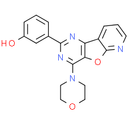Description
PI-103 is a potent, cell-permeable, ATP-competitive inhibitor of phosphatidylinositol 3-kinase (PI3K) family members with selectivity toward DNA-PK, PI3K (p110α), and mTOR.
Product information
CAS Number: 371935-74-9
Molecular Weight: 348.36
Formula: C19H16N4O3
Synonym:
PI103
PI 103
Chemical Name: 3-(4-morpholinopyrido[3',2':4,5]furo[3,2-d]pyrimidin-2-yl)phenol
Smiles: OC1C=C(C=CC=1)C1=NC2=C(OC3=NC=CC=C23)C(=N1)N1CCOCC1
InChiKey: TUVCWJQQGGETHL-UHFFFAOYSA-N
InChi: InChI=1S/C19H16N4O3/c24-13-4-1-3-12(11-13)17-21-15-14-5-2-6-20-19(14)26-16(15)18(22-17)23-7-9-25-10-8-23/h1-6,11,24H,7-10H2
Technical Data
Appearance: Solid Power
Purity: ≥98% (or refer to the Certificate of Analysis)
Solubility: DMSO: 24 mg/mL(68.89 mM). Water: Insoluble.
Shipping Condition: Shipped under ambient temperature as non-hazardous chemical or refer to Certificate of Analysis
Storage Condition: Dry, dark and -20 oC for 1 year or refer to the Certificate of Analysis.
Shelf Life: ≥12 months if stored properly.
Stock Solution Storage: 0 - 4 oC for 1 month or refer to the Certificate of Analysis.
Drug Formulation: To be determined
HS Tariff Code: 382200
How to use
In Vitro:
PI-103 potently inhibits both the rapamycin-sensitive (mTORC1) and rapamycin-insensitive (mTORC2) complexes of the protein kinase mTOR. PI-103 inhibits constitutive and growth factor-induced PI3K/Akt, as well as mTORC1 activation. In blast cells, PI-103 inhibits leukemic proliferation, the clonogenicity of leukemic progenitors and induces mitochondrial apoptosis, especially in the compartment containing leukemic stem cells. PI-103 inhibits p110α >200-fold more potently than p110β. PI-103 also potently blocks production of PI(3, 4)P2 and PIP3 in adipocytes and PIP3 in myotubes. PI-103 inhibits phosphorylation of Akt with an IC95 100-fold lower than that for LY294002. Strikingly, PI-103 completely protects animals from insulin-stimulated decline in blood glucose. PI-103 has additive proapoptotic effects with etoposide in blast cells and in immature leukemic cells.
In Vivo:
When tumors reach 50-100 mm3, animals are randomized and treated with vehicle or PI-103. PI-103 exhibits significant activity, decreasing average tumor size by 4-fold after 18 days. Mice treated with PI-103 have no obvious signs of toxicity premorbidly (based on body weight, food and water intake, activity, and general exam) or at necropsy. Treated tumors display decreased levels of phosphorylated Akt and S6, consistent with blockade of p110α and mTOR. PI-103 treatment is cytostatic to glioma xenografts.
References:
- Raynaud FI, et al. Mol Cancer Ther. 2009, 8(7), 1725-1738.
- Fan QW, et al. Cancer Cell, 2006, 9(5), 341-349.
- Knight ZA, et al. Cell, 2006, 125(4), 733-747.
Products are for research use only. Not for human use.
Payment & Security
Your payment information is processed securely. We do not store credit card details nor have access to your credit card information.


